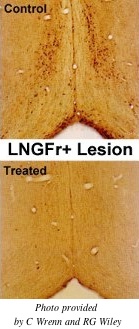Targeting Cholinergic Neurons with 192-IgG-SAP
Lee et al. examined the effects of chronic stress on changes in spatial learning and underlying molecular signaling induced by cholinergic depletion. Previous studies revealed that loss of cholinergic input to the hippocampus reduces the expression of glucocorticoid receptors (GRs) and activates nuclear factor-kappa B (NF-κB) signaling through interactions with the cytoplasmic catalytic subunit of protein kinase A (PKAc). The effects of chronic stress on cognitive status and GR-PKAc-NF-κB signaling were examined in rats with a loss of cholinergic input to the hippocampus and cortex. 31 Rats received 192 IgG-SAP (Cat. #IT-01) injections 0.3 mcl (0.25 mcg/mcl) to selectively eliminate cholinergic neurons in their basal forebrain. Rats that experienced only cholinergic depletion were mildly impaired in acquiring a spatial water maze task. Most importantly, rats that experienced both cholinergic depletion and chronic stress exhibited severe impairments in acquisition and retention of spatial memory tasks.
- Impact of Chronic Stress on the Spatial Learning and GR-PKAc-NF-κB Signaling in the Hippocampus and Cortex in Rats Following Cholinergic Depletion. Lee SY, Cho WH, Lee YS. et al. Mol Neurobiol (2017). doi:10.1007/s12035-017-0620-5. PMID: 28551869

